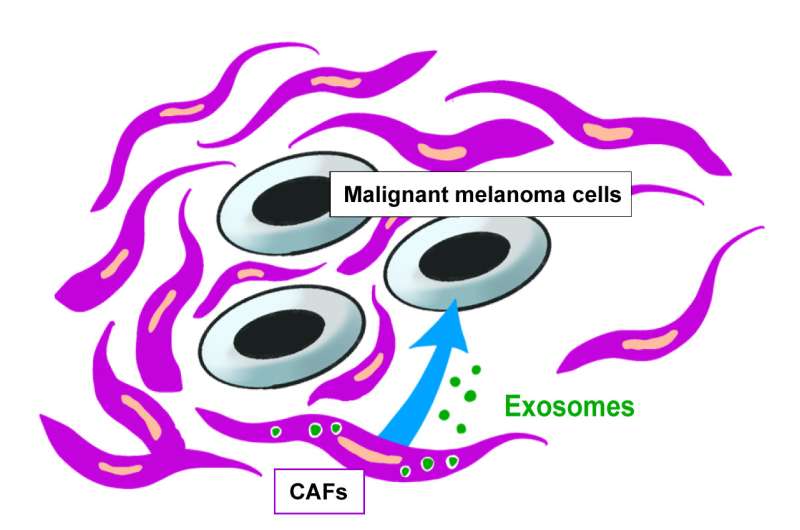This article has been reviewed according to Science X's editorial process and policies. Editors have highlighted the following attributes while ensuring the content's credibility:
fact-checked
trusted source
proofread
Certain exosomes found to inhibit malignant melanoma growth, providing important prognostic marker

Cancer-associated fibroblasts (CAFs) are key factors in the tumor microenvironment, which have been implicated in cancer cell progression. It has also been reported that vesicles called exosomes produced by these CAFs play an important role in cancer progression. An Osaka Metropolitan University research group investigated the effect of CAF-derived exosomes on the growth of malignant melanoma cells. They found that CAF-derived exosomes express CD9 and CD63 transmembrane proteins, and that the CD9-positive exosomes may inhibit the growth of malignant melanoma cells.
Malignant melanoma is a relatively aggressive type of skin cancer. When detected early, it is usually treatable by surgical resection only, but metastases develop and often spread to distant areas. Currently, tumor thickness and the presence of ulceration are some of the known prognostic factors used as indicators of malignant melanoma. Therefore, the discovery of valuable markers to assess the malignant potential of melanoma more accurately are necessary to develop appropriate treatments.
Cross talk between cancer cells and surrounding stromal cells is believed to orchestrate cancer progression through a variety of mechanisms. Cancer-associated fibroblasts (CAFs)—key factors in the tumor microenvironment—in particular have been implicated in cancer cell progression. It has also been reported that the exosomes, a type of small vesicles, produced by CAFs play an important role in cancer progression.
A research group led by Naho Fujii, M.D., and Professor Hisashi Motomura from Osaka Metropolitan University Graduate School of Medicine investigated the effect of CAF-derived exosomes on the growth of malignant melanoma cells. The group found that the transmembrane proteins CD9 and CD63 were mainly present on CAF-derived exosomes, and that among the exosomes, the CD9-positive ones inhibited the growth of malignant melanoma cells.
"As a plastic surgeon, usually I provide surgical treatment for skin cancer, but I have wanted to study other treatment methods for a long time," explained Fujii, M.D. "This study suggests that CD9-positive exosomes inhibit the growth of malignant melanoma, so CD9-positive exosomes may be a useful marker to evaluate the malignant grade of melanoma. We expect further research will lead to the development of new treatments in that line."
The study is published in the journal Anticancer Research.
More information: Naho Fujii et al, CD9-positive Exosomes Derived from Cancer-associated Fibroblasts Might Inhibit the Proliferation of Malignant Melanoma Cells, Anticancer Research (2023). DOI: 10.21873/anticanres.16130


















